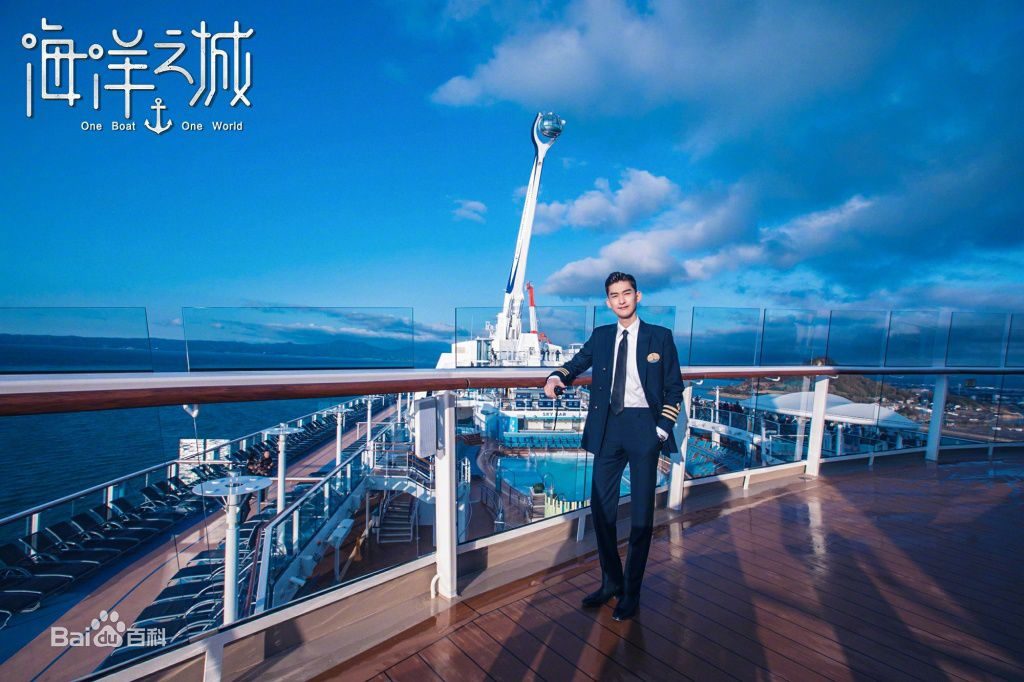
Zhang Han will star in the new cruise ship drama ‘One Boat, One World.” Photo: One Boat, One World / Baidu
Despite a previously optimistic outlook, China’s cruise industry has not taken off in China as some may have hoped. In the past few years, China’s cruise industry has seen annual growth in the number of passengers of around 70 percent. This year, the number of passengers is expected to fall by about 14 percent. Major cruise operators are withdrawing ships from China, and on March 19, Ctrip and Royal Caribbean announced that the joint venture they established in 2014, SkySea Cruise Line, will be ceding operations.
It may then come as a surprise that a new Chinese TV drama titled One Boat, One World, telling the aspirational story of Chinese crew members aboard a Royal Caribbean ship, kicked off filming in early January.
Pop culture, movies, and TV have been shown to have a considerable impact on young Chinese travelers. Just as Lost in Thailand did for Thai tourism, and Game of Thrones for Europe, will One Boat, One World, starring famous actor Zhang Han and actress Wang Likun be the soft-power push needed to turn the Chinese cruise industry around?
One Ship, One World
Expected to be a hit drama, One Boat, One World began filming aboard a Royal Caribbean ship in early January. The show’s patriotic, chicken-soup-for-the-soul plot centers around a young Chinese man, the ship’s first mate, who dreams of working his way up to the top and helping China break into the Western-dominated cruise industry. The role is played by Zhang Han, one of the stars of last year’s record-breaking nationalistic film Wolf Warrior 2.
Besides a good-looking cast of popular, young Chinese and foreign actors and actresses, and a novel setting, the show has many other promising elements.
According to an inside source, script is extremely well-written, in a style more similar to a Hollywood show than a typical Chinese production. While there is the over-arching narrative of the first mate’s journey, each episode focuses on a different story, all related to individual passengers’ experiences aboard the ship. Many of these passenger stories were, in fact, taken from real-life. The drama’s director, Chen Kunhui, spent three years researching the script, taking numerous cruises and interviewing passengers and crew members about their experiences. One Boat, One World is his passion project, and he has been working around the clock to make it succeed.
With its good-looking cast of young Chinese and foreign actors and actresses, and its novel setting, the show is sure to draw attention. But will this attention translate into growth for the cruise industry?
The “Lost in Thailand Effect”
Over and over again we have seen the powerful impact that movies and TV can have on driving Chinese outbound tourism.
One of the most classic cases was the 2012 runaway hit Lost in Thailand. According to Thailand’s Tourism Authority, the number of Chinese tourists rose by 93 percent to 1.12 million in the first quarter of 2013 and Chiang Mai, the filming location, became the first stop for most Chinese travelers to the country.
Seattle has seen similar success with the 2013 Chinese romantic comedy Finding Mr. Right. The film’s popularity helped attract more than 75,000 Chinese visitors to the seaport city in 2013 alone.
In 2015, the romantic film Somewhere Only We Know, the first ever Chinese film to be set in Prague, reached number one at the box office and had Chinese audiences swooning over Prague’s cobblestone streets in its Old Town and medieval district where the filming took place.
More recently, Wolf Warrior 2, the biggest-selling domestic movie in Chinese box office history, has inspired adventurous travelers to visit Africa and Chinese online travel provider Ctrip discovered that Game of Thrones is putting countries like Croatia, Northern Ireland, and Iceland on the map for Chinese tourists. Ctrip reported that the number of Chinese tourists who booked a visit to Croatia through the website in the first half of 2017 increased by 300% compared with 2016, while Iceland saw its tour booking numbers increase by 148%.
And these are only a few of the most prominent case studies. According to Mafengwo, 25% of Chinese FIT travelers will visit a film or TV shooting location during their next domestic or international trip. 42% of these FIT travelers are from the post-90s generation, meaning this is a hugely popular travel experience among young people. In a recent interview with People’s Daily, Pan Haodong, TripAdvisor’s CEO in China remarked that “the influence of pop culture, movies and TV to tourists is huge, especially to the young generation. Hit shows like ‘Game of Thrones’ have a great impact on the tourism of the shooting location.”
The lack of demand for cruises does not necessarily indicate a dislike for the industry. Instead, it is likely related to a lack of awareness and understanding. Going on a cruise is not a part of Chinese culture the way it is in the West; it is not something they have grown up around. Perhaps a show like One Boat, One World is just what the Chinese cruise industry needs to clear up Chinese consumers misconceptions and spark their interest in the cruise ship experience.
-This article originally appeared on Jing Travel.








